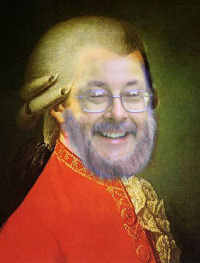A 365-Day Project
"We Are All Mozart"
A project to create
new works and change
the perception of the
music of our time.


 November 6, 2006
November 6, 2006 
Days there are with no clarity. This was one. It was dull, unmusical, uncreative. Cleaning, reorganizing, archiving, and advice. At the end of the day, some backgrounded television drone came to the surface, saying "We don't have time for fear, the luxury of self-doubt." At first I was reminded of the present administration's self-assuredness, and then I realized why it had bubbled up from vocal drone to clear words: I have been living with self-doubt, and it has not felt like a luxury.
The time has come (I thought this morning) to offload work and history. Having purchased more hard drives and more CDs and DVDs to archive projects, I recognized how much time was consumed by history. A complimentary email arrived; the writer had written, "your treatment of the issue of digital archival longevity and viability is the best I've ever read", referring to my article on archiving. Archiving has begun to creep over the work, obscuring its personal meaning and replacing it with a sense of burden.
This sense of burden has not been so acute since a more rash time of my life. The release of that burden came with the destruction of forty scores and electronic compositions as a work of art called "The Detonacy" at the Delaware Valley Festival of the Avant-Garde in Trenton, New Jersey, on May 23, 1976. The aftersense was what in acoustics might be called "ringing" -- a sudden overshoot of elation, and almost-equal distress, and a sequence of ups and downs that gradually flattened out and returned to a kind of creative normalcy. The juvenilia was gone, and what remained was what seemed imaginative and valuable. It was time to move into new musical worlds.
And that ringing and settling into normalcy happened. But also, since that day in May of 1976, another six hundred compositions have been created, along with a knee-deep flood of ephemera: scores, instruments, costumes, programs, concert recordings, tear sheets, negatives and photos and slides and film and video, crates of correspondence, and now piles of data.
A few of today's hours were spent in the basement building six two-foot-long wooden boxes for data disks -- not enough boxes even for now, it turns out, much less for the next few years. More tomorrow. Cardboard boxes of correspondence were wrapped in plastic and will shortly go into the hayloft. Data on older hard drives is being moved to newer formats this week as well. And in the temporal interstices, scores are in the process of touchup for new editions for January's Chamber Music America national conference; most are done. Only the 1996 string quartet Hoots and Honks remains messy, and the ever-growing Wedding Changes is actually being expanded from three flutes to flute choir.
But it's all history. The weight is enormous some days. There are websites to keep up, too, some regular readers of these commentaries may not know about. The nascent Trans/Media historical site, my equestrian music site, the continuing revisions to Kalvos & Damian, the sputtering NonPop International Network, the historic country stores, and several dozen more.
What's to be done with all this so it can be pushed away from the work of the day? A well-known composer who lives not far organizes her day very carefully, composing undisturbed for a tight schedule of hours, working on marketing for another group of hours, preparing scores during others, tending to her entire professional life as a well-managed business, including tidy shelves of what she's done over the years. Another composer has already made arrangements for a university to receive his entire life's work. Others have publishers who tend their creative gardens and create tidy boxes of legacy. And others -- those who are beyond my understanding -- have no interest in their own past, always moving ahead into new territory. Are they really unconcerned with what their present is built upon? Do they keep no memories of creations or children or parents gone?
There is a resentment about living surrounded by the past. The past is not an affectation. I am a kind of curator of archives: mine, other composers, arts organizations. One kind of work that I do is restoring old recordings, especially for families. To bring back a voice long silent is a great joy. Last year it was a pleasure to restore over twelve hours of personal conversations recorded in the 1960s for a family in North Carolina. Bringing back voices is deeply humbling as well. But some days there is too much past. This is one.
Yes, this day had no clarity at all. The car was brought in for repairs this morning, leaving us with our 1988 Ford Ranger for transportation -- cute and reliable if pepless. And of course it's November, a month of shortening days during which winter can be seen ahead like a cloud cloaking an abyss just beyond it, with summer and fall fond memories. The doors are closed. Tonight the wood stove was lit for the first time this season. The mail brings dreadfully cheerful Christmas catalogs, confused with the work undone past & future and reminding me not so much of laughing Santas but the wreckage of Joyce's Araby: "Gazing up into the darkness I saw myself as a creature driven and derided by vanity; and my eyes burned with anguish and anger."

Wooden boxes for data disks, with a cardboard one's contents being transferred. Behind them, one wall of the Kalvos & Damian CD library.